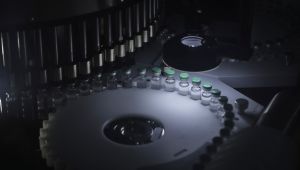North Korea poses a tougher test of President Bush's new national security strategy than Iraq did. According to published reports, the CIA believes that the North Koreans may have up to two nuclear weapons built from plutonium reprocessed as long ago as the first Bush administration. During meetings in Beijing last week, a North Korean negotiator declared that Pyongyang already had nuclear weapons. What is left to negotiate? Plenty. If its arsenal consists of only two untested weapons, North Korea has a very limited nuclear capacity. But if it reprocesses the spent fuel at its Yongbyang plant, it will have enough plutonium for six more weapons, and much more when its secret uranium enrichment plant comes on line.
Some Americans think we have a strong hand because of our victory in Iraq. But in fact, North Korea's tactics changed before the war and after a secret visit from a high-ranking Chinese official and China's three-day stoppage of oil supplies. The good news is that China is worried about a nuclear North Korea. The bad news is that Pyongyang may have changed it tactics but not its objectives. Not surprisingly, Kim Jong Il wants both nuclear weapons and South Korean aid with no strings attached.
The key question is whether we can force North Korea to choose between its two key objectives. The shape of a deal is easy to outline. North Korea gives up its nuclear program in a verifiable manner, and so long as it remains non-nuclear, the United States guarantees not to attack and South Korea provides economic assistance on a basis of reciprocity. But the devil lies in the details. China prefers such a deal but claims that its influence on Pyongyang is limited. In addition, it fears that the collapse of the regime would produce chaos on its borders.
In South Korea, the new president, Roh Moo Hyun, was elected by a younger, nationalistic generation that is less fearful of the North and more distrustful of the United States. Maintaining a common bargaining position will be difficult and will be a key item on the agenda of the upcoming summit with President Bush.
North Korea is known for brinksmanship bargaining. Negotiations will be long and difficult. Even if a deal is reached, it is not clear that Kim Jung Il can be trusted. After all, it now appears that he began building a secret enrichment plant in 1995 soon after the 1994 Framework Agreement that halted his reprocessing operations and subjected the facilities at Yongbyang to inspections.
Faced with these difficulties, one can understand why some in the administration seek other options. But President Bush is likely to discover many of the same difficulties that confronted President Clinton a decade ago. A surgical military strike would require exact knowledge of where the enrichment plant is located and the spent fuel is being stored.
Moreover, North Korea could respond by attacking Seoul with some of the 11,000 artillery tubes hidden in caves in the Demilitarized Zone only 35 miles away. Even without nuclear weapons, a few shells on the Seoul stock exchange would wreak destruction on the South Korean economy, and escalation to a full war could involve hundreds of thousands of casualties. UN sanctions and an embargo are a less risky option, though Pyongyang has threatened to reply with force.
Some American officials argue that the best option is malign neglect.
The United States should resist any bargain that would legitimize the regime and provide it with resources. In this view, the best solution to the nuclear problem is to let the regime collapse. But a dictator who is willing to starve his own people has proven more durable than many analysts have predicted. And China is unlikely to let the regime collapse. Unless collapse was to come soon, this option will present us with a fully nuclear North Korea that will destabilize the region. Even worse, the regime could smuggle plutonium or enriched uranium to other states or to terrorist groups.
President Bush has little choice but to explore negotiations with the full realization that they will be difficult and have no guarantee of succeeding. North Korea, not Iraq, is the true test of whether his new national security strategy is workable. And it will be a tough test to pass.
Nye, Joseph. “Bush Faces a Tougher Test in North Korea.” The Boston Globe, May 7, 2003




